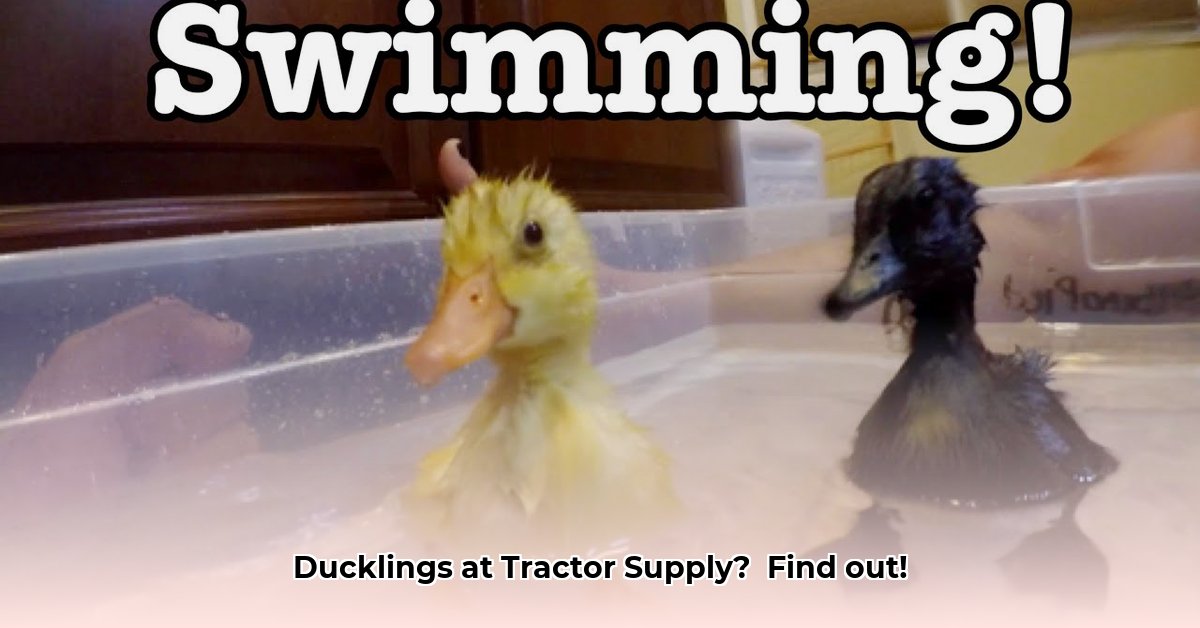
Duckling Tractor Supply Ducks: A Seasonal Market Deep Dive
The surging popularity of backyard poultry has fueled a significant increase in duckling demand, particularly during Tractor Supply's popular "Chick Days" program. This seasonal surge presents both opportunities and challenges for Tractor Supply, its suppliers, and consumers. Understanding the market dynamics, ethical considerations, and responsible duckling care is essential for all stakeholders. For more info on Tractor Supply's chick program, check out this helpful resource.
The Ups and Downs of Duckling Demand
Tractor Supply's duckling sales exhibit a strong seasonal pattern, peaking in spring. This mirrors the natural breeding cycles of ducks and aligns with the increased consumer interest in raising backyard poultry. The high demand of Tractor Supply's annual "Chick Days" presents significant logistical challenges. Accurate forecasting of duckling demand is crucial to avoid shortages or surpluses. Is the current system effectively meeting this dynamic demand?
Where Do Tractor Supply's Ducklings Come From?
Tractor Supply partners with a network of hatcheries to supply ducklings. This established network ensures a relatively consistent supply. However, this partnership model has limitations. Consumers might face challenges finding specific breeds, and minimum order quantities (usually six in-store, ten online) can be a barrier for those seeking smaller numbers. The lack of complete transparency regarding individual hatchery practices presents a crucial ethical consideration.
Ethical Concerns: A Deeper Look
Ethical sourcing and animal welfare are paramount concerns in the duckling supply chain. Questions surrounding humane raising practices at hatcheries, safe transportation methods, and the overall well-being of the ducklings need to be addressed. Responsible sourcing isn't just about acquiring ducklings; it's a commitment to their well-being throughout their journey.
Making it Work: Actionable Steps for Everyone
Collaborative efforts are necessary to ensure ethical and sustainable duckling sales. The following actions are recommended for all stakeholders:
Tractor Supply: Enhance "Chick Days" planning with improved demand forecasting, explore smaller order options, and enhance online ordering and delivery systems. Long-term strategies include broadening livestock selections, creating educational materials on duck care, and analyzing and minimizing the environmental impact of their operations.
Duckling Suppliers: Scale up production to meet peak demand while maintaining ethical standards. Focus on a wider range of duck breeds, and implement improved transportation methods to minimize stress on the animals. Long-term strategies include developing breeds that are less prone to disease and adopting sustainable and ethical farming practices.
Consumers: Carefully plan purchases, research breeds beforehand, and prioritize responsible duckling care. Support ethical and sustainable farming and advocate for stronger animal welfare regulations.
Regulatory Bodies (e.g., USDA): Strengthen animal welfare monitoring, and ensure transportation regulations are strictly enforced. Investigate the environmental impact of large-scale duck farming and help establish industry standards for responsible farming.
Caring for Your New Ducklings: A Step-by-Step Guide
Successfully raising ducklings requires knowledge and commitment. These steps are crucial:
Housing: Provide a safe, dry environment protected from the elements and predators. A well-ventilated coop or a secure outdoor area is ideal.
Nutrition: Feed ducklings high-quality food formulated specifically for their needs. Consult your local feed store for appropriate options. Proper nutrition is essential for growth and health.
Hydration: Always ensure access to fresh, clean water. Ducklings require ample water intake.
Health: Maintain a clean environment to minimize the risk of disease. Closely monitor your ducklings for signs of illness and seek veterinary help if needed. Prevention is far better than cure.
Observation: Regularly check your ducklings for signs of stress or illness. Early intervention is key to successful duckling rearing.
How to Ensure Ethical Duckling Sourcing for Backyard Poultry
Key Takeaways:
- Seasonal availability of ducklings through Tractor Supply’s "Chick Days" program requires careful planning.
- Transparency in the duckling supply chain, from hatchery to consumer, is vital for ethical sourcing.
- Prioritizing duckling welfare at every stage, from hatching to transport and care, is crucial for responsible ownership.
Tractor Supply and Your Duckling Dreams: A Seasonal Affair
Tractor Supply's "Chick Days" program presents a convenient option for acquiring ducklings, but limited seasonal availability mandates advance planning. Be aware of your local store's participation dates.
Navigating the Duckling Supply Chain: From Hatchery to Home
Understanding the duckling supply chain is paramount for ethical sourcing. The lack of complete transparency regarding certain aspects of the supply chain poses a challenge. This gap in transparency requires greater consumer awareness and advocacy for greater industry standards.
Consumer Craze and Ethical Concerns: A Balancing Act
The growing popularity of backyard poultry necessitates a balanced approach. The surge in demand must not compromise the well-being of the animals. Ethical sourcing requires conscientious consumer choices and support for responsible suppliers.
Ethical Sourcing: What Does It Really Mean?
Ethical sourcing involves prioritizing duckling welfare at each stage of their journey. This encompasses humane rearing practices at hatcheries, stress-free transportation, and healthy, disease-free ducklings. Choosing suppliers with demonstrably high welfare standards is a crucial step.
Practical Steps Toward Ethical Duckling Ownership
- Research: Investigate hatcheries and suppliers carefully, seeking evidence of humane practices.
- Reputable Source: Prioritize welfare over price when selecting a supplier.
- Inspection: Thoroughly inspect ducklings for health and alertness before purchase.
- Transportation: Ensure stress-free transportation to minimize harm.
- Care: Provide safe, clean, and comfortable housing and ongoing care.
- Veterinary Care: Consult an avian veterinarian promptly should any health concerns arise.
Responsible Duckling Care: A Holistic Approach
Responsible duckling care extends beyond simple feeding. It encompasses optimal nutrition, impeccable hygiene, and a secure environment, adapted to the ducklings' evolving needs as they mature. A balanced diet, clean water, and appropriate housing are essential, together with preventative measures such as the use of niacin supplements to prevent leg problems.